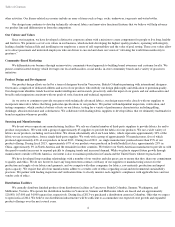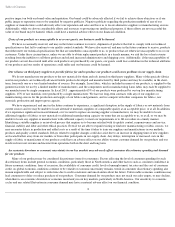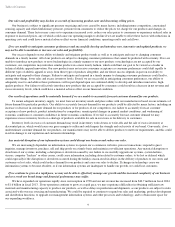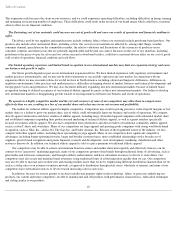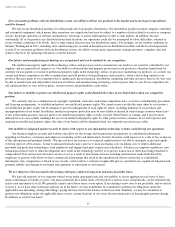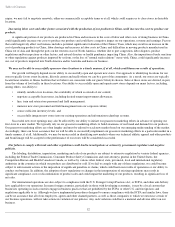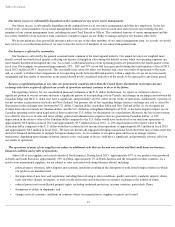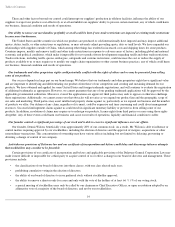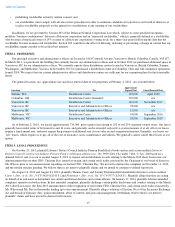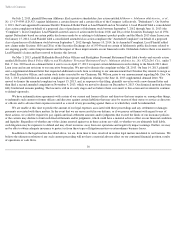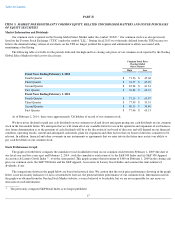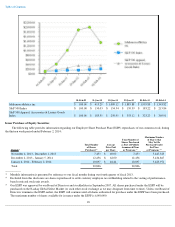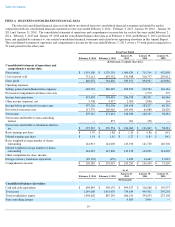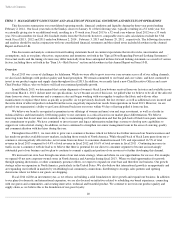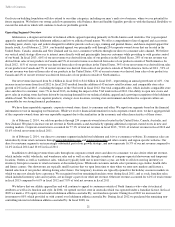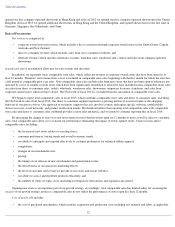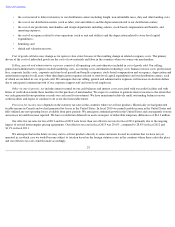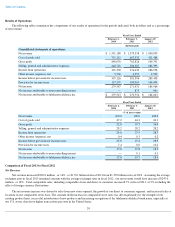Lululemon 2013 Annual Report Download - page 19
Download and view the complete annual report
Please find page 19 of the 2013 Lululemon annual report below. You can navigate through the pages in the report by either clicking on the pages listed below, or by using the keyword search tool below to find specific information within the annual report.
Table of Contents
These and other factors beyond our control could interrupt our suppliers' production in offshore facilities, influence the ability of our
suppliers to export our products cost-effectively or at all and inhibit our suppliers' ability to procure certain materials, any of which could harm
our business, financial condition and results of operations.
Our ability to source our merchandise profitably or at all could be hurt if new trade restrictions are imposed or existing trade restrictions
become more burdensome.
The United States and the countries in which our products are produced or sold internationally have imposed and may impose additional
quotas, duties, tariffs, or other restrictions or regulations, or may adversely adjust prevailing quota, duty or tariff levels. We have expanded our
relationships with suppliers outside of China, which among other things has resulted in increased costs and shipping times for some products.
Countries impose, modify and remove tariffs and other trade restrictions in response to a diverse array of factors, including global and national
economic and political conditions, which make it impossible for us to predict future developments regarding tariffs and other trade restrictions.
Trade restrictions, including tariffs, quotas, embargoes, safeguards and customs restrictions, could increase the cost or reduce the supply of
products available to us or may require us to modify our supply chain organization or other current business practices, any of which could harm
our business, financial condition and results of operations.
Our trademarks and other proprietary rights could potentially conflict with the rights of others and we may be prevented from selling
some of our products.
Our success depends in large part on our brand image. We believe that our trademarks and other proprietary rights have significant value
and are important to identifying and differentiating our products from those of our competitors and creating and sustaining demand for our
products. We have obtained and applied for some United States and foreign trademark registrations, and will continue to evaluate the registration
of additional trademarks as appropriate. However, we cannot guarantee that any of our pending trademark applications will be approved by the
applicable governmental authorities. Moreover, even if the applications are approved, third parties may seek to oppose or otherwise challenge
these registrations. Additionally, we cannot assure you that obstacles will not arise as we expand our product line and the geographic scope of
our sales and marketing. Third parties may assert intellectual property claims against us, particularly as we expand our business and the number
of products we offer. Our defense of any claim, regardless of its merit, could be expensive and time consuming and could divert management
resources. Successful infringement claims against us could result in significant monetary liability or prevent us from selling some of our
products. In addition, resolution of claims may require us to redesign our products, license rights from third parties or cease using those rights
altogether. Any of these events could harm our business and cause our results of operations, liquidity and financial condition to suffer.
Our founder controls a significant percentage of our stock and is able to exercise significant influence over our affairs.
Our founder, Dennis Wilson, beneficially owns approximately 28% of our common stock. As a result, Mr. Wilson is able to influence or
control matters requiring approval by our stockholders, including the election of directors and the approval of mergers, acquisitions or other
extraordinary transactions. This concentration of ownership may have various effects including, but not limited to, delaying, preventing or
deterring a change of control of our company.
Anti-takeover provisions of Delaware law and our certificate of incorporation and bylaws could delay and discourage takeover attempts
that stockholders may consider to be favorable.
Certain provisions of our certificate of incorporation and bylaws and applicable provisions of the Delaware General Corporation Law may
make it more difficult or impossible for a third-party to acquire control of us or effect a change in our board of directors and management. These
provisions include:
14
•
the classification of our board of directors into three classes, with one class elected each year;
•
prohibiting cumulative voting in the election of directors;
•
the ability of our board of directors to issue preferred stock without stockholder approval;
• the ability to remove a director only for cause and only with the vote of the holders of at least 66
2
/ 3
% of our voting stock;
• a special meeting of stockholders may only be called by our chairman or Chief Executive Officer, or upon a resolution adopted by an
affirmative vote of a majority of the board of directors, and not by our stockholders;




